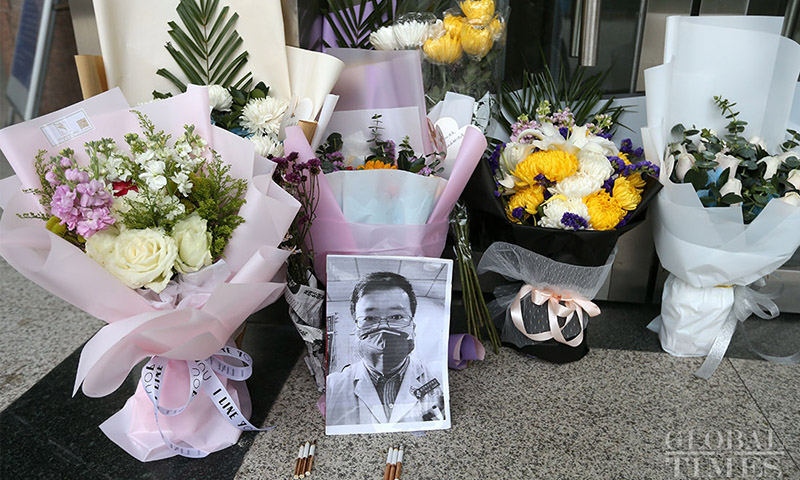
Photo: Li Wenliang
The Shenzhen city government aims to provide legal protection for "whistle-blowers" in public health emergency events, in the wake of the death of Wuhan doctor Li Wenliang, which triggered public reflection on the health emergency warning and reporting system in China.
In a bid to plug loopholes in the public health emergency reporting system and better deal with future public health risks, Shenzhen in South China's Guangdong Province said it is mulling the adoption of a regulation to protect "whistle-blowers" who report potential public health emergency hazards.
The regulation said it encourages citizens, legal entities and organizations to report information on hidden dangers in public health emergencies through public health hotlines, and tip off any late reporting, false reporting, concealment in public health emergencies.
"Whistle-blowers" shall be protected by the relevant departments with regard to their personal information and personal safety. They will not be investigated for legal responsibility if they do not make a malicious report, the regulation said.
Although Li Wenliang, an ophthalmologist from the Central Hospital of Wuhan who tried to warn his friends of the novel coronavirus, was not the "whistle-blower" for the COVID-19 epidemic, Li's case has brought the public health emergency warning and reporting system in China under the spotlight. Another Wuhan doctor, Zhang Jixian, who reported cases of unknown pneumonia three days earlier than Li, was the first to report COVID-19 cases.
The Shenzhen government released the regulation and is soliciting public opinions until July 31.
Chinese analysts hailed Shenzhen's legal protection for "whistle-blowers," but suggested it the government should rely more on opinions from medical professionals.
"Public health issues require professional judgment, which ordinary citizens lack. If anyone can report the risks, it might lead to chaos in investigating the report. Thus, the draft should differentiate between reports from normal citizens and medical professionals," Wang Guangfa, a leading Chinese respiratory expert at Peking University First Hospital in Beijing and a member of a national medical expert team dispatched to Wuhan in early January, told the Global Times on Monday.
Liu Changqiu, a health law expert and research fellow at the Shanghai Academy of Social Sciences, told the Global Times that Shenzhen's draft should include health departments deciding whether a report is malicious or not, and police departments that lack professional knowledge should not make the decision alone.
In Li's case, he was summoned and reprimanded by police for "spreading false information." Local police later withdrew the reprimand order against Li and apologized to his family.
As for the role of professional health departments and local governments, the regulation said the Shenzhen Center for Disease Control and Prevention (CDC) should submit a written report to the local health commission within two hours of incidents that constitute a public health emergency, and the local health commission then has to submit a written report to the Shenzhen government within two hours.
After receiving a public health emergency report, the Shenzhen government shall make a decision within 24 hours on whether to initiate an emergency response. The municipal government shall submit a written report to the Guangdong provincial government after the emergency response is initiated.
Wang said that in reporting a possible public health emergency incident, the most important thing is making sure the reporting channel is not blocked, and it should stress that administrative departments cannot downplay the incident or even conceal it.
In order to guarantee smooth and effective reporting, Wang said more supplementary measures are required, such as establishing an independent public health incident investigation commission to independently assess the public health issue and provide professional suggestions for local governments in adopting emergency measures.
"Experts from the commission should come from medical institutions and local CDCs but they cannot hold any administrative positions in government organs, so that administrative departments cannot intervene in their professional assessment," Wang said.
Chinese netizens on Monday praised Shenzhen's draft, and said more local governments should formulate similar regulations.
Liu said that environmental protection and production safety sectors should also come up with whistle-blowing mechanisms to protect those who report hidden risks.
China's State Council proposed the establishment of whistleblower systems in September 2019 to enhance public supervision channels and upgrade government reporting platforms in terms of market and safety supervision.
In June, the Ministry of Emergency Management issued a draft regulation to offer "whistleblowers" at production and operation firms cash rewards if their tip-offs directly prevent an accident that could have caused fatalities.


